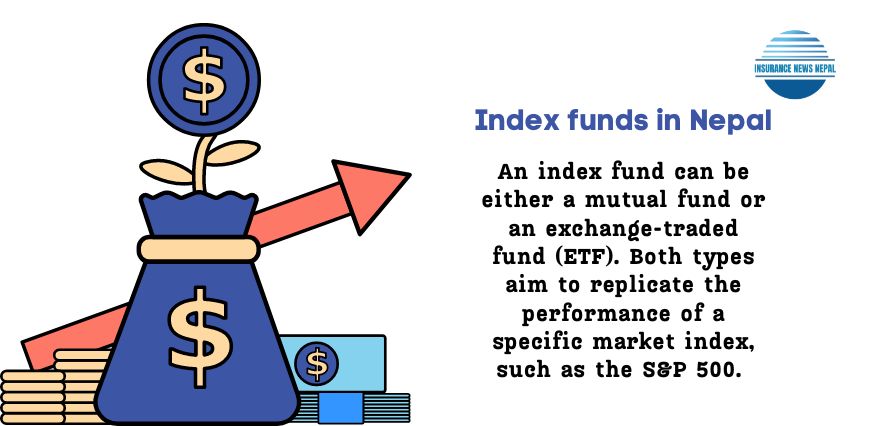First and foremost, Nepal unfortunately does not have index funds. But that does not mean SEBON (Security Exchange Board of Nepal) won’t introduce index funds in Nepal in the future. Or, if you’re not in Nepal but are interested in investing here, this is the perfect article for you which will give you all the information you need about index funds (in Nepal’s context).
Through this article, you will understand what an index fund is, what an index is, what are the benefits of investing in index funds, the drawbacks of investing in index funds, and whether index funds in Nepal should be initiated or not.
[ez-toc]
What is an index fund?
An index fund is an investment fund that pools the money that you invest and reinvests that money into other companies. This enables you to get a diversified market portfolio and thus minimizes your risk. But you know how the saying goes, lower the risk, lower the return. However, do note that index funds won’t rise and fall like individual stocks. Instead, it keeps rising gradually over time.
Should Index funds be introduced in Nepal?
Weighing both the pros and cons of index funds, it is safe to say that introducing Index Funds in Nepal would be a plus point. It is the question of whether the Security Board of Nepal would change the current regulatory framework to initiate Index Funds in Nepal. Nepal now has a growing economy as compared to the past 10 years according to Central Beaurea of Statistics Nepal, meaning both the companies and interested investors can earn and prosper in the long run using index funds.
Index Fund is the easiest way to enter the capital market if you’re a beginner or do not have time to analyze the market and trade actively. Either way, it is a safe way for people to invest their money with relatively low risk.
What is an index?
It is a way of measuring the performance of the market by looking at a sample of stocks or a group of stocks. Now you may feel like you could create an index but, only the established financial companies design and maintain indexes.
To understand this better, you can learn about these three indexes:
- NYSE Composite Index: The NYSE Composite Index shows the combined value of all common stocks listed in the New York Stock Exchange. This includes stocks from various sectors and industries, providing us with an overview of the entire NYSE(New York Stock Exchange).
- S&P 500 index: S&P 500 or the Standard and Poor’s 500 measures the performance of all the 500 large companies listed in the United States. It is one of the most widely followed equity indices and is a major indicator of the U.S. stock market’s health.
- S&P Mid Cap Index: This is a part of the S&P Dow Jones Indices Family. It measures the performance of 400 medium-sized companies listed on the Stock Exchange in the United States.
What are the advantages of index funds in Nepal?
- Easy to manage: If you are not actively trading stocks and don’t have the time, index funds are the best option. You do not have to worry about the stock market and the constant movement in the stock market.
- Tax Benefits: You pay tax when you make a transaction, but since there are fewer transactions in index funds, fewer capital gains are leading you to enjoy tax benefits.
- Low fees: You need not actively manage and trade in the stock market, this reduces costs compared to actively managing funds.
- Broad Market Exposure: When you invest in index funds, you get market exposure to different stocks from different sectors. This lowers the risk.
What are the disadvantages of index funds in Nepal?
- No control over the portfolio: You invest in index funds you do not get to pick and choose what stocks you want. Index funds are passively managed and you cannot select individual stocks of your choice. And even if your stock’s value is declining, you cannot sell them and the index funds will passively hold onto them.
- Long wait: To reap the full benefits of index funds, you need to play the waiting game. If you want a quick return in a short period, index funds are probably not meant for you.
You may also like:
- Unit Investment Trusts (UIT)
- Exchange-Traded Funds (EFT): Definition, Types Explained
- Difference between a limit order and a stop order
FAQs
How do Index funds make you money?
Can I invest in an index fund in India from Nepal?
What are the three major index funds globally?
Should I invest in Index Funds?
Are index funds better than Mutual Funds?
Is there index fund in Nepal
Conclusion
The growing economy, stock literacy of the people, and the want of the people to enter the stock market seem like a green light for SEBON(Security Board of Nepal) to introduce Index funds in Nepal. Index Funds would increase investment in the capital market and also make it easier to track investments and capital gains.

